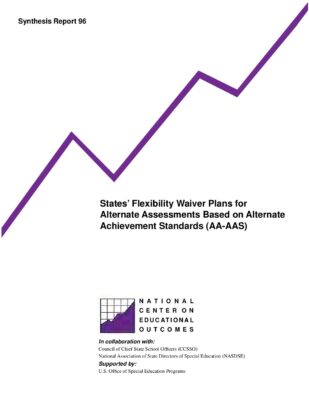Resource Hub
Explore guides, research papers, policy briefs, and tools to aid decisions on standards and assessments.
States’ Flexibility Waiver Plans for Alternate Assessments Based on Alternate Achievement Standards (AA-AAS)
This report compiles, analyzes, and summarizes states’ waiver applications for flexibility from the Elementary and Secondary Education Act (ESEA) requirements regarding alternate assessments based on alternate achievement standards (AA-AAS). The report analyzed states’ ESEA waiver applications that had been approved as of May 2014 by asking the following two research questions: (1) In what ways did the applications include the new assessments being developed by the federally funded AA-AAS consortia (Dynamic Learning Maps [DLM], National Center and State Collaborative [NCSC])? and (2) What specific plans for an AA-AAS were included in states’ flexibility applications? Information from the state waiver applications that were related to the AA-AAS, alternate achievement standards, and students with disabilities who participated in an alternate assessment were compiled and coded. Results from the analyses and discussion are presented. This report was written in collaboration with the Council of Chief State School Officers (CCSSO) and the National Association of State Directors of Special Education (NASDSE), with support by the U.S. Office of Special Education Programs.


This research report effectively defines its purposes and uses an acceptable methodology in its data collection and analysis. Communications quality is typical of most research reports, meaning that it requires a fair degree of knowledge of this specific topic. Users are most likely to be state department of education officials who want to know what other states are doing, or say that they are doing, in their waiver applications for flexibility from the Elementary and Secondary Education Act (ESEA) requirements regarding alternate assessments, based on alternate achievement standards. Users should also be aware that the information collected in this report often represents what states say they are doing or plan to do, but the information has not been verified. Nevertheless, this report could well save states from repeating work on their own.